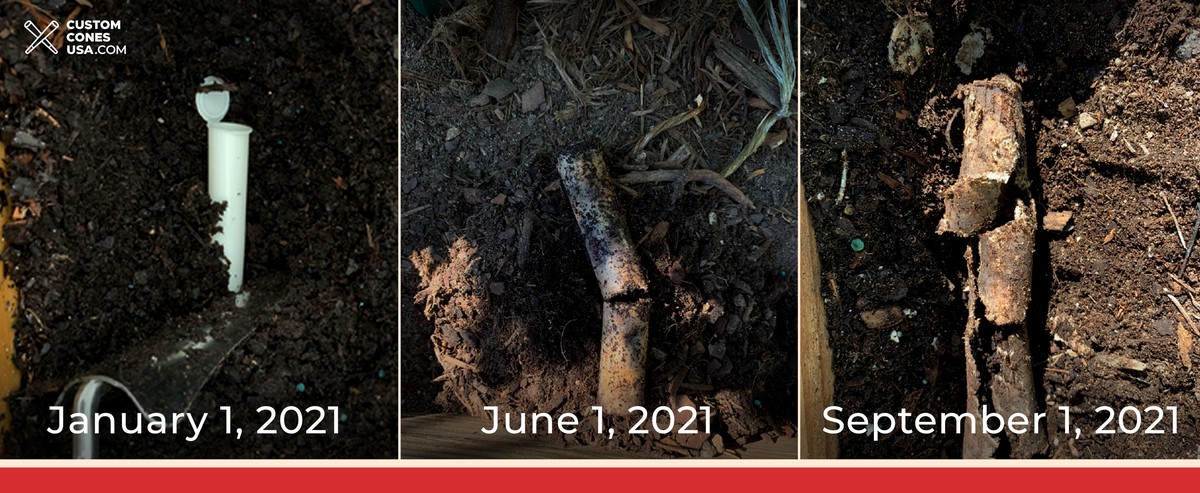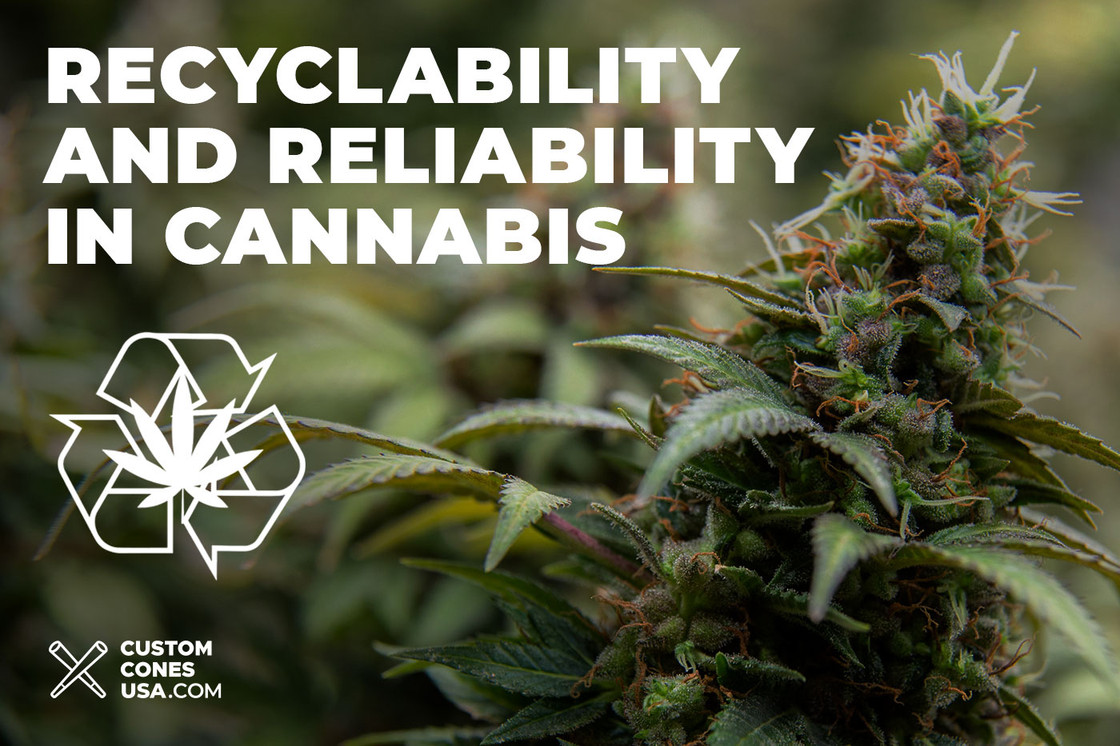Facts about Biodegradable and Eco-Friendly Cannabis Packaging
Posted by Custom Cones USA on Dec 3rd 2021
For decades, the cannabis industry has largely been associated with being a green industry—no pun intended. Comprised of folks pushing the boundaries on green farming techniques, environmentalists, and socially-conscious consumers, one would think that the cannabis industry would be the most green industry in the world. Despite how forward-thinking the industry is, cannabis producers and processors must abide by strict packaging laws which make eco-friendly cannabis packaging a nearly impossible feat. That being said, Custom Cones USA is attempting to solve that problem with a (genuinely) green cannabis packaging option.
Introducing the Biodegradable EcoLine Pre-Roll Tube!

Custom Cones USA is proud to launch the world’s first home-compostable, certified child-resistant pop-top tube! This product is made in collaboration with the Composting Manufacturing Alliance (CMA) and is comprised of plant-based carbohydrates, glycerin, and synthetic polymers. This pop-top tube may be the first to achieve commercial acceptance in composting facilities across the U.S. This is a huge deal!
Words Matter.
When consumers read “sustainability,” they often think “eco-friendly.” The ”eco-friendly” reputation has many nuances - for instance, did you know that it is more profitable to brand your business as “environmentally friendly?” Recently, Forbes published that 54% of Gen Z and 50% of Millennials are willing to pay 10% more from a “sustainable” brand.
Additionally, the strict child-resistant laws, along with other packaging legalities, encourage cannabis brands to swap sustainability for compliance. Making things even more difficult are all the terms, buzzwords, and marketing gimmicks that packaging companies, and even brands themselves, use to make their ordinary packaging look and sound more environmentally friendly than it really is.
Recyclable, eco-friendly, sustainable, compostable, environmentally friendly, biodegradable…the list goes on! Whether it’s the actual cannabis brand sugar-coating how eco-friendly their packaging really is or the brand getting tricked by clever marketing folks at the packaging companies, most buyers and consumers don’t understand the nuances between all these terms—that’s what we’re here for!
Is Your Packaging Actually Sustainable?
What does “sustainable” truly mean in the context of cannabis packaging? If you are thinking the term “sustainable” or “eco-friendly” feels a bit ambiguous and all-encompassing—you’re right! These terms don’t have carefully regulated definitions, so they can mean different things to different people. There are, however, terms that are regulated, which can help you better understand how environmentally friendly your packaging actually is.
- Biodegradable - capable of being slowly destroyed and broken down into very small parts by natural processes, bacteria, etc.
- Compostable - of organic matter, especially kitchen waste, able to be made into compost.
- *Compost - decayed organic material used to enhance/fertilize the soil
- Recyclable - a substance or object that can be recycled
- *Recycle - convert waste into reusable material; return material to a previous stage in a cyclic process; use again.
- Post-Consumer Waste - a waste type produced by the end consumer of a material stream; that is, where the waste-producing use did not involve the production of another product. Quite commonly, it is simply the waste that individuals routinely discard, either in a waste receptacle or a dump, or by littering, incinerating, pouring down the drain, or washing into the gutter.
- Made from Recycled Materials - a product that was manufactured with recycled materials either collected from a recycling program or from waste recovered during the normal manufacturing process.
- FSC-Certified - The FSC certification is considered the "gold standard" designation for wood harvested from forests that are responsibly managed, socially beneficial, environmentally conscious, and economically viable.
Have you heard the phrase “single-use plastics?” We know that single-use plastics are not sustainable because they can only be used once, and while most industries are turning away from single-use plastics, this shift is particularly difficult for cannabis companies.
As we mentioned earlier, cannabis brands must adhere to strict packaging laws, such as child-resistant (CR) and tamper-evident laws. These laws, along with thin margins and onerous federal tax laws, compel the need for cheap packaging, and is the reason why single-use plastics are all over dispensary shelves.
A classic example of an unsustainable, single-use plastic packaging item is the pop-top tube for pre-rolled joints and blunts. The pop-top tube has been around since the dawn of the cannabis industry and has been a hit due to two main reasons - the pop-top tube is both certified child-resistant and very cheap!
This begs the question—why aren’t more companies designing biodegradable pre-roll tubes?
In general, eco-friendly "plastics" or materials are not as durable or reliable as plastic, so it's significantly harder to make child-resistant packaging out of them. The “pop-top” mechanism complies with child-resistant standards, but its engineering forces the packaging company to use unsustainable materials. The “living hinge” on the pop-top tube needs to be vulnerable enough to bend back and forth, multiple times. Unfortunately, many eco-materials or biodegradable pre-roll tubes are too weak to satisfy this “living hinge,” resulting in breakage.
Biodegradable vs. Compostable – What's the Difference?
All compostable material is biodegradable—but not all biodegradable material is compostable.
Biodegradable materials will break down over time into smaller and smaller pieces. Compostable materials are organic matter that break down fully and leave behind no toxic residue.
For biodegradability to effectively decompose, it needs an ideal environment. Ironically, an ideal environment for a successful biodegradation process is difficult to achieve, due to illegal dumping/littering. This results in microplastics, a serious pollutant threatening the ecosystem all over the globe.
Alternatively, we don’t have to worry about these microplastics with compostable materials! Why? Organic matter, like eggshells, is not laced with accelerators or chemicals commonly found in biodegradable plastics. This is why packaging made from compostable matter is a truly sustainable option.
Good Plastics vs. Bad Plastics
The only downside to these compostable pop-top tubes, as well as any other compostable cannabis packaging solution, is that these packaging options are more expensive compared to traditional plastic options. The cannabis industry is incredibly competitive, so companies are already competing on price. To make matters worse, cannabis companies also face much higher taxes, so every penny counts when it comes to sustainable cannabis packaging.
The cheaper, but less eco-friendly cannabis packaging options on the market are often made with chemical accelerators that help the package break down more quickly in landfills. Theoretically, this accelerator sounds helpful. In reality, the accelerator breaks down the biodegradable package into pesky harmful microplastics.
EcoPure is an example of one of these accelerators. EcoPure “causes plastic to biodegrade through a series of chemical and biological processes in a landfill environment.” The intention behind this additive is a good one - to accelerate the plastic biodegradation process, but the results of the additive are pollutant microplastics.
“Microplastic pollution has become a major global environmental problem in parallel with global climate change and ozone depletion. A large amount of evidence showed that microplastics might become a lasting problem. Microplastics have spread all over the world, in freshwater, in the atmosphere, in soil, in sediment, in seafood, in the oceans, even in bottled water we drink. Due to the lack of enzymes to degrade microplastics, microplastics will accumulate in the digestive system. Microplastics can damage the digestive tract and stomach of organisms, and long-term intake may reduce the feeding rate of organisms.” -Environmental Science and Pollution Research
Another overlooked microplastic source of cannabis packaging are the legal labels adhered to the tubes, bags, and tins. Often, the packaging biodegrades back into the ecosystem, but the labels adhered to the packaging do not. This is because the labels that are legally required on cannabis packaging are typically made from traditional plastics. If your packaging is truly compostable, but your label is not, then the compostability of the packaging is severely compromised.
It’s relevant to note; if customers knew to rip off these “non-eco” labels of pop-top tubes, pre-roll tins, and bags then cannabis packaging could uphold a more sustainable standard. Unfortunately, most customers don't know to rip off these labels.
Let’s focus on the solutions, though! Another sustainable packaging option is using recyclable plastics. Post-consumer waste (waste that individuals routinely discard, either in a waste receptacle/dump/by littering/incinerating/pouring down the drain/washing into the gutter) can be turned into durable cannabis packaging, too! Check out this tube made from recycled ocean plastic. It is 100% High-Density Polyethylene (HDPE), which means it classifies as #2 recyclable. The “#2” recyclable is one of the five recyclable plastics with the highest recyclability rate. Here are the top five recyclable plastics that can be used for sustainable packaging, and what they can be used for:
- 1. PETE - Polyethylene Terephthalate: water bottles, cooking oil containers, plastic peanut butter jars, and others alike! (recyclable)
- 2. HDPE - High density polyethylene: milk jugs, shampoo bottles, cleaning product containers, and others alike! (recyclable)
- 3. LDPE - Low density polyethylene: grocery bags, bread bags, produce bags, and others alike! (limited recyclability)
- 4. PP - Polypropylene: yogurt container, straws, and bottle caps. (limited recyclability)
- 5. PS - packing peanuts, coffee cups, to-go food containers. (limited recyclability)
While these plastics are recyclable on their own, they lose a lot of that recyclability once they are paired with cannabis. The issue with recycling cannabis-related plastics is that most recycling centers refuse to accept cannabis-related materials due to federal regulations.
For example, Colorado has tried and failed multiples times to implement recycling programs for cannabis packaging. Many states, like Colorado, house dispensaries that lead recycling programs for their used packages. Sadly, these programs become unsuccessful because “recycling centers refuse to accept cannabis-related materials due to federal regulations - in Colorado, if there is any THC in donated packages, the recycling center considers those packages ‘drug contraband’ which they are not allowed to take due to federal prohibition.”
The ultimate sustainable packaging solution is on the rise; the Biodegradable EcoLine Pre-Roll Tubes from Custom Cones USA are fully compostable and truly eco-friendly!

